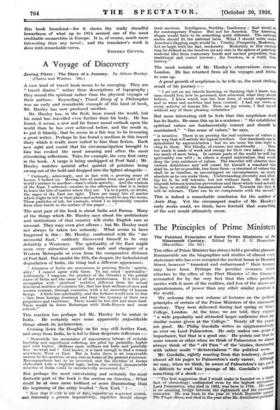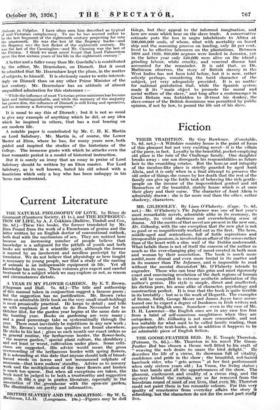The Principles of Prime Ministers
The Political Principles of Some Prime Ministers of the Nineteenth Century.- Edited by F. -J. C. Hearnsliaw. (Macmillan. 12s.. 6d.) THE office of Prime Minister has always held a peculiar glamour. Innumerable are the biographies and studies of almost every statesman who has ever occupied the modest house in Downing Street, however " transient and embarrassed" their tenancy may have been. Perhaps the peculiar romance which attaches to the office of the First Minister of the Crown 15 accounted for by the very fact that- this -office • probably carries with it more of the realities, and Jess of the shows and appurtenances, of power than any other similar position in
the world. •
We welcome this new volume of lectures on the political principles of -certain of the Prime Ministers of the nineteenth century. They were delivered- during last spring at King's College, London. At the time, we are 'told, they enjoyed " a wide popularity and attracted larger audiences than any similar -course given at -the College." 'Nearly all the papers are good. Mr. Philip Guedalla writes as epig,rammatically as ever on Lord Palmerston. He only makes one point of importance; but that is a "good one." He points out- that for some reason or other when we think of Palmerston we almost always think of the " old Pam " of the 'sixties, -dominating with rather senile " dictatorialness " the political scene. Mr. Guedalla, rightly reacting from this tendency, devotee almost all his pages to Palmerston's early career. Although we may, -when we think, be aware of Pahnerston's age, yet it is difficult to read this passage. of Mr. Guedalla's without something of a shock The first suggestion that I would make is founded on a &WI' fact of chronology, undisputed even by the highest authorities' Lord Palmerston, who died in 1865, was born in 1784. His carte is an amazing bridge, between the eighteenth and- the ninetel centuries. Ho was orn in the year in which Reynolds pad The Tragic Muse, and died in the year after Mr. Swinburne publiw°- Atalanta in Calydon. I have often seen him described as typical of mid-Victorian complacency. To me he has seemed rather to be the last fragment- of the eighteenth century projecting far into the nineteenth. He was the—last of the- Regency bucks—and the Regency was the last flicker of the eighteenth century. He _ was the last of the Canningites—and Mr. Canning was the last of the Pittites. I think we must never forget that Lord Palmerston spent the first sixteen years of hislife in the eighteenth century."
A better and a fuller essay than Mr. Guedalla's is contributed by the editor, Mr. Hearnshaw, on Disraeli. But it must be admitted that Mr. Hearnshaw kept the plum, in the matter of subjects, to himself. It is obviously easier to write interest- ingly on Disraeli than on any other Prime Minister of the list century. Mr. Hearnshaw has an attitude of almost unqualified admiration for this statesman :- "While the influence of most Victorian prime ministers has become faint and indistinguishable, and while the memory of the majority has grown dim, the influence of Disraeli is still living and operative, and his memory a flowering evergreen."
It is usual to say this of Disraeli ; but it is not so usual to give any example of anything which he did, or any idea which he inspired in others, that has a real bearing on our modern life.
A notable paper is contributed by Mr. C. H. K. Martin on Lord Salisbury. Mr. Martin is, of course, the Lower Master at Eton, where he has, for many years now, both guided and inspired the studies of the historians of the College. The immense gusto with which he attacks even the least romantic period is a model of historical instruction. But it is surely an irony that an essay in praise of Lord Salisbury should be written by an Eton master. For Lord Salisbury, as is well known, hated his old school with a fanaticism which only a boy who has been unhappy in his 'teens can understand.



























































 Previous page
Previous page